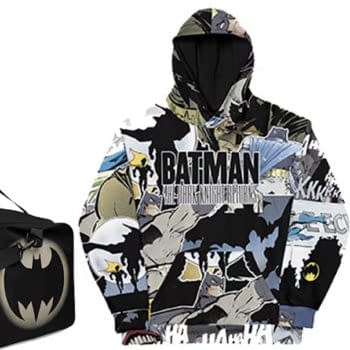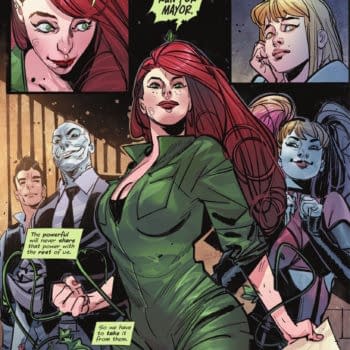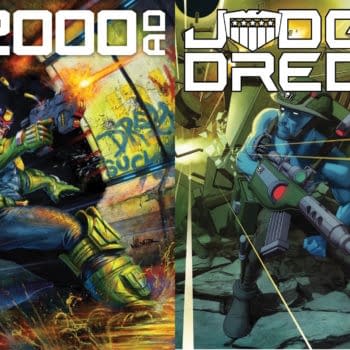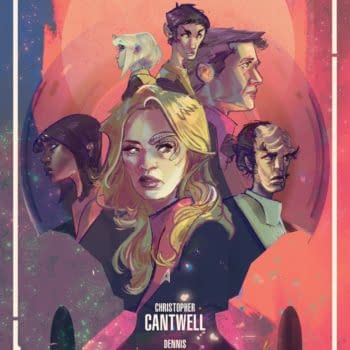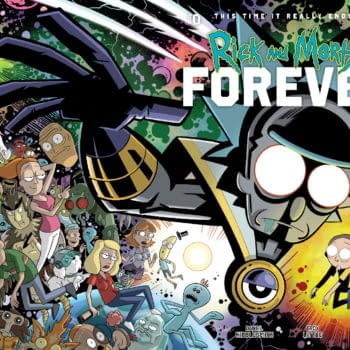Posted in: Comics, Recent Updates | Tagged: fantasy, neil gaiman, novel, temps
Look! It Moves!: Roz Kaveney Talks Rituals: Rhapsody of Blood
Adi Tantimedh writes;
Last week, I introduced you to Roz Kaveney and her first published novel RITUALS: RHAPSODY OF BLOOD Book One. The novel features parallel plotlines about two very different women: Mara the Huntress, an immortal who witnessed the dawn of the first gods and has spent the last few millennia curving her way through her share of gods and would-be gods who sought power through human blood rituals, and Emma, a former Oxford scholar from the 1980s who becomes a freelance problem-solver for the underworld of supernatural entities. Buzz about the novel continues to build, including with this review by Jo Walton at Tor.com.
As promised, here's my interview with Roz. It is not unbiased because she is a long-time friend and the questions are loaded with insider information, especially about how her experiences as a literary critic and political activist have come to inform her novel.
Roz, before we start on RITUALS: RHAPSODY OF BLOOD Book One, I'd like to talk to you about the BUFFY slashfic you wrote. It's a lot more amusing coming from you.
BUFFY came along at a tough time in my life – I'd been blocked on fiction for a while because of a novel that had not sold, and a novel that died on me. I'd been working on a biography that fell down because the author I wrote about was so unreliable it took too much work to establish facts about her. Also, I'd spent much of the previous decade on civil liberties politics and was pretty disillusioned about that and the rise of New Labour. I was in the mood for fun and for something that would get me writing again. I talked a publisher into the project that became READING THE VAMPIRE SLAYER and a friend raised the issue of how Buffy fans would feel about an elderly literary person intellectualizing in their world. So I thought to myself, how do I acquire fannish cred in a world of media fandom that's always been somewhere over there from the fanzine fandom I was part of in . So I thought – well fan-writing and fanfic was part of what I was studying and enjoying so I wrote my first ever fanfic as an experiment.
People still come and ask me about my First Slayer story BED OF BONES and that's partly because I set myself an interesting challenge in it – a story without dialogue- and partly because it has heart. I now realize that it was also something in which I started to explore the poetic side of my writing, but that was a long way off.
I got interested in Whedon's characters and his dialogue. I learned a lot about writing from doing fanfic and if RITUALS is better than my early stories in the MIDNIGHT ROSE anthologies and my unpublished non-genre fiction, it's partly setting myself to be that snarky and smart in imitation of his style. Friends said, why are you bothering to do this, and I said – and was originally lying a little – that I was doing it because the novel I would write at some future date would be all the better for it. Only that became true, I think. Fanfic gave me confidence back and reminded me that writing was fun.
(The MIDNIGHT ROSE series is how Roz and Neil Gaiman identified the universe in which TEMPS and THE WEERDE were set. – Adi)
Can those BUFFY femslash stories still be found online?
I could not possibly comment because of copyright issues – people can find it if they look. Anyone who likes RITUALS will probably like the Cordelia fics and the Dawn fics in particular…
So how much did writing the slashfic and getting feedback from the fan community help you with starting what's basically a big and ambitious multiple-book fantasy series?
It gave me confidence and got me back into thinking ambitiously
What inspired you to create Mara, Emma and Caroline? Emma and Caroline seem to come from some insider experiences of student life at Oxford.
Totally, but in a way there is something more. I was at Oxford pre-transition and there was a sense in which I was seriously alienated by knowing that I was not having the Oxford experience I might have had in other circumstances. The relationship between Emma and Caroline is partly to do with that sense of alienation- especially in its class aspects. It's not just that I was at Oxford it was that I was a messed-up working class trans kid at Oxford managing to have a good time anyway, and learn to fit in.
Mara seems to embody the archetype of the Goddess of the Hunt, though she hates and refuses to the title of 'goddess'. She's also the main conduit for themes of power, violence and the abuse of power.
She is in a sense the ultimate activist – sometimes doing NGO politics where you have to be polite to people you loath gets very wearing. She never lies or softens things or backs down. I have a reputation among those who know me in a political context for being fearless and quixotic and a bad enemy. Mara was my way of exploring how it would be not to make all the compromises I actually made in the 90s.
On the flip-side, you have Emma, who has no powers other than her wits and intelligence. She can't really fight, so she has to think and talk her way out of things. Is this contrast between Emma and Mara intentional?
Absolutely – they are different archetypes and also draw on different aspects of my own experience. They are ways of looking at the world who have gradually become my close imaginary friends who are smarter and better than me.
.
We've had loads of discussions about Edward Gibbons' THE HISTORY OF THE DECLINE AND FALL OF THE ROMAN EMPIRE over the years, and I found not necessarily references but the snarky, ironic sensibility of Gibbon in the tone of RITUALS in the way Emma and Mara observe the arrogance and hubris of powerful men, gods, and would-be gods. Was it your plan to write the series as a meditation on Power and History as much as a screwball fantasy adventure?
Gibbon is certainly a factor – he even gets a guest slot in Book 2. In retrospect, the book is much more political than I planned it to be but that was probably denial at work. I wanted a structure that would let me write about a lot of my obsessions – the Steve Brust cool stuff theory of writing – and I wanted to be terrifying and hilarious at the same time .I had learned the hard way that I am not cut out for SF – the novel THE LACING that died on me and that people can look at online if they want – it's on my website – and screwball fantasy struck me as the way to go. After all, my Midnight Rose3 stories inhabit that space, but also I spent part of the 90s working with John Clute on the Encyclopedia of Fantasy, and I ended up doing a lot of thinking about what I would like to see.
I see the gods in the story a metaphors for the rich and powerful and how they treat people as their pawns and playthings. Was this analogy a conscious choice?
In my NGO days and in publishing I've met a lot of bullies and twisters – you write what you know. Not so much analogy as a way of describing.
Emma and Caroline have a snarky screwball comedy repartee, especially when observing the more po-faced characters they encounter. They often say things people wish they could in real life if they were just quick and witty enough. Was there ever a concern that you might be indulging in Mary Sue-ism or was that just part of the mix to lend more texture to the bigger ideas and themes in the story?
A lot of my friends – the late Abi Frost for example – really are or were that smart and funny. I probably mythologize people a bit – it's a flaw- but it is less Mary Sue-ism than letting all your geese be swans. For reasons that will emerge down the track, there are reasons why Emma is scarily smart. The book needs her to be like that so it really is not Mary Sue-ism so much as building something firmly in.
So what are your views on Mary Sue-ism?
For me, the book isn't just about that, but to some extent a comment about that in Fantasy fiction.
I could feel you were bringing your experience as a critic to bear on the actual writing of your own fiction after decades of dissecting and examining other people's work.
In that area as in so much else, I wanted to explore the things I think fantasy should do and does not. I wanted heroines whose heroism was organic to the book I was writing rather than a default setting, I wanted heroines who felt fallible, tired, scared – above all depressed that they have not saved more lives. One of the things about superheroes and other genre figures is how rarely they talk about messing up – Emma saves the world at one point and crows about it. She also at one point kills a bunch of nasty people quite ruthlessly – in some ways she is just as tough-minded as Mara and not as compassionate.
So, without spoiling anything, I take it that given how dark and nasty things can get, we can't assume everyone's going to be come out hunky-dory by the end of the fourth book?
I can guarantee that these are books in which all outcomes are only a bit positive and no one is safe. I hope that I establish this quite early on. There. As Mara says 'I am the protector of the weak against the strong but I cannot save them all'. In the end, I trust very few people – as Emma says, 'people talk about magic being a technology of will, as if that were a good thing'.
Reading the Fantasy life at lookitmoves@gmail.com
Follow the official LOOK! IT MOVES! twitter feed at http://twitter.com/lookitmoves for thoughts and snark on media and pop culture,
stuff for future columns and stuff I may never spend a whole column writing about.
Look! It Moves! © Adisakdi Tantimedh






